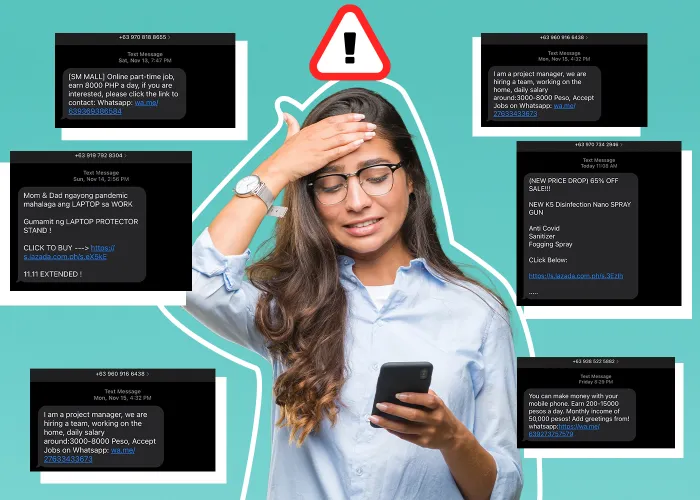We Replied to One of Those Spam Texts Offering Sketchy ‘Jobs’ and Here’s What We Found Out

Editor's note: Smishing is a cybersecurity attack done via mobile text messaging. The National Privacy Commission strongly urges the public not to open links found in suspicious messages from unknown numbers.
Social media has been abuzz lately with complaints from netizens against a spate of spam text messages containing dubious offers, including part-time job opportunities and links to product promotions.
Over the past week, this writer received at least 10 messages from unknown numbers offering some of those sketchy jobs. Interestingly, while the messages came from different numbers, they seemed to follow the same script: the sender would often introduce themselves as a “project manager” from an unnamed “hiring team.” This would be followed by an online job offer that they said could pay anywhere between P200 and P15,000 a day. Their script would end with a call-to-action—inviting the recipient to click on a third-party link to know more about the job.
Aside from these job offers, we also received product promotions from unknown mobile numbers, with the messages containing links to online e-commerce shops.
As a curious cat, this writer replied to one of those texts and here’s what we found out:


The message that we replied to redirected to a WhatsApp number. After about five hours, we got a reply confirming if we were an applicant. Then, came the best part: the job details.
To summarize, you’d have to place orders for certain products to help boost their rankings. The catch is that you’d have to spend your own money to be able to place those orders. Commissions are earned only after successfully completing a task.
What Authorities are Doing About It
While they appear harmless, these spam messages raise concerns about data privacy. Some netizens also noted how the wave of these unsolicited messages coincided with the implementation of COVID-19 contract tracing forms, where the public are obliged to disclose personal particulars including their name and mobile numbers.
Due to netizens’ clamor, the National Privacy Commission (NPC) on Nov. 23 said it has summoned Globe Telecom, Smart Communications, Dito Telecommunity, Lazada, Shopee, and several banks to report on their spam prevention measures in the wake of these unsolicited messages.
Privacy Commissioner Raymund Liboro dismissed suspicions that the recent smishing activities are conducted by a group that has gained unauthorized access to contact tracing forms. Instead, such activities are run by a “global crime syndicate” based on the NPC’s initial investigations, he said.
Liboro also reminded the public to remain vigilant, scrutinize text messages, and be wary when opening suspicious links.
Subscribe to The Beat's newsletter to receive compelling, curated content straight to your inbox! You can also create an account with us for free to start bookmarking articles for later reading.

Most Popular in Manila


Trending in Manila



